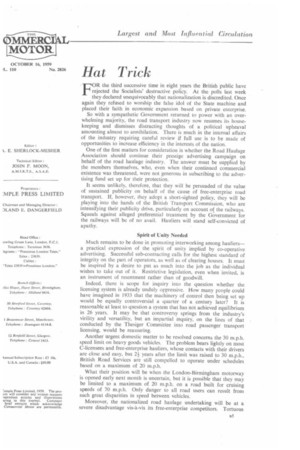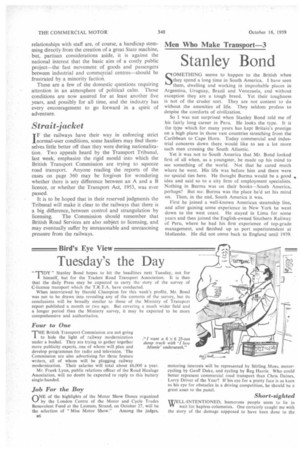Hat Trick
Page 39

Page 40

If you've noticed an error in this article please click here to report it so we can fix it.
FOR the third successive time in eight years the British public have rejected the Socialists' destructive policy. At the polls last week they declared unequivocably that nationalization is discredited. Once again they refused to worship the false idol of the State machine and placed their faith in economic expansion based on private enterprise.
So with a sympathetic Government returned to power with an overwhelming majority, the road transport industry now resumes its housekeeping and dismisses distracting thoughts of a political upheaval amounting almost to annihilation. There is much in the internal affairs of the industry requiring careful review if full use is to be made of opportunities to increase efficiency in the interests of the nation.
One of the first matters for consideration is whether the Road Haulage Association should continue their prestige advertising campaign on behalf of the road haulage industry. The answer must be supplied by the members themselves, who, even when their continued commercial existence was threatened, were not generous in subscribing to the advertising fund set up for their protection.
It seems unlikely, therefore, that they will be persuaded of the value of sustained publicity on behalf of the cause of free-enterprise road transport. If, however, they adopt a short-sighted policy, they will be playing into the hands of the British Transport Commission, who are intensifying their publicity drive, particularly on account of the railways. Squeals against alleged preferential treatment by the Government for the railways will be of no avail. Hauliers will stand self-convicted of apathy.
Spirit of Unity Needed Much remains to be done in promoting interworking among hauliers— a practical expression of the spirit of unity implied by co-operative advertising. Successful sub-contracting calls for the highest standard of integrity on the part of operators, as well as of clearing houses. It must be inspired by a desire to put as much into the job as the individual wishes to take out of it. Restrictive legislation, even when invited, is an instrument of resentment rather than of goodwill.
Indeed, there is scope for inquiry into the question whether the licensing system is already unduly oppressive. How many people could have imagined in 1933 that the machinery of control then being set up would be equally controversial a quarter of a century later? It is reasonable at least to question a system that has not achieved equilibrium in 26 years. It may be that controversy springs from the industry's virility and versatility, but an impartial inquiry, on the lines of that conducted by the Thesiger Committee into road passenger transport licensing, would be reassuring.
Another urgent domestic matter to be resolved concerns the 30 m.p.h. speed limit on heavy goods vehicles. The problem bears lightly on most C-licensees and free-enterprise hauliers, whose contacts with their drivers are close and easy, but 21 years after the limit was raised to 30 m.p.h., British Road Services are still compelled to operate under schedules based on a maximum of 20 m.p.h.
What their position will be when the London-Birmingham motorway is opened early next month is uncertain, but it is possible that they may be limited to a maximum of 20 m.p.h. on a road built for cruising speeds of 70 m.p.h. Only danger to all road users can result from such great disparities in speed between vehicles.
Moreover, the nationalized road haulage undertaking will be at a severe disadvantage vis-à-vis its free-enterprise competitors. Tortuous B5 relationships with staff are, of course, a handicap stemming directly from the creation of a great State machine, but, partisan considerations aside, it is against the national interest that the basic aim of a costly public project—the fast movement of goods and passengers between industrial and commercial centres—should be frustrated by a minority faction.
These are a few of the domestic questions requiring attention in an atmosphere of political calm. Those conditions are now assured for at least another five years, and possibly for all time, and the industry has every encouragement to go forward in a spirit of adventure.
Strait-jacket
TF the railways have their way in enforcing strict 'normal-user conditions, some hauliers may find themselves little better off than they were during nationalization. Two appeals heard by the Transport Tribunal, last week, emphasize the rigid mould into which the British Transport Commission are trying to squeeze road transport. Anyone reading the reports of the cases on page 360 may be forgiven for wondering whether there is any difference between an A and a B licence, or whether the Transport Act, 1953, was ever passed.
It is to be hoped that in their reserved judgments the Tribunal will make it clear to the railways that there is a big difference, between control and strangulation by licensing. The Commission should remember that British Road Services are also subject to licensing, and may eventually suffer by Unreasonable and unreasoning pressure from the railways.




















































































































